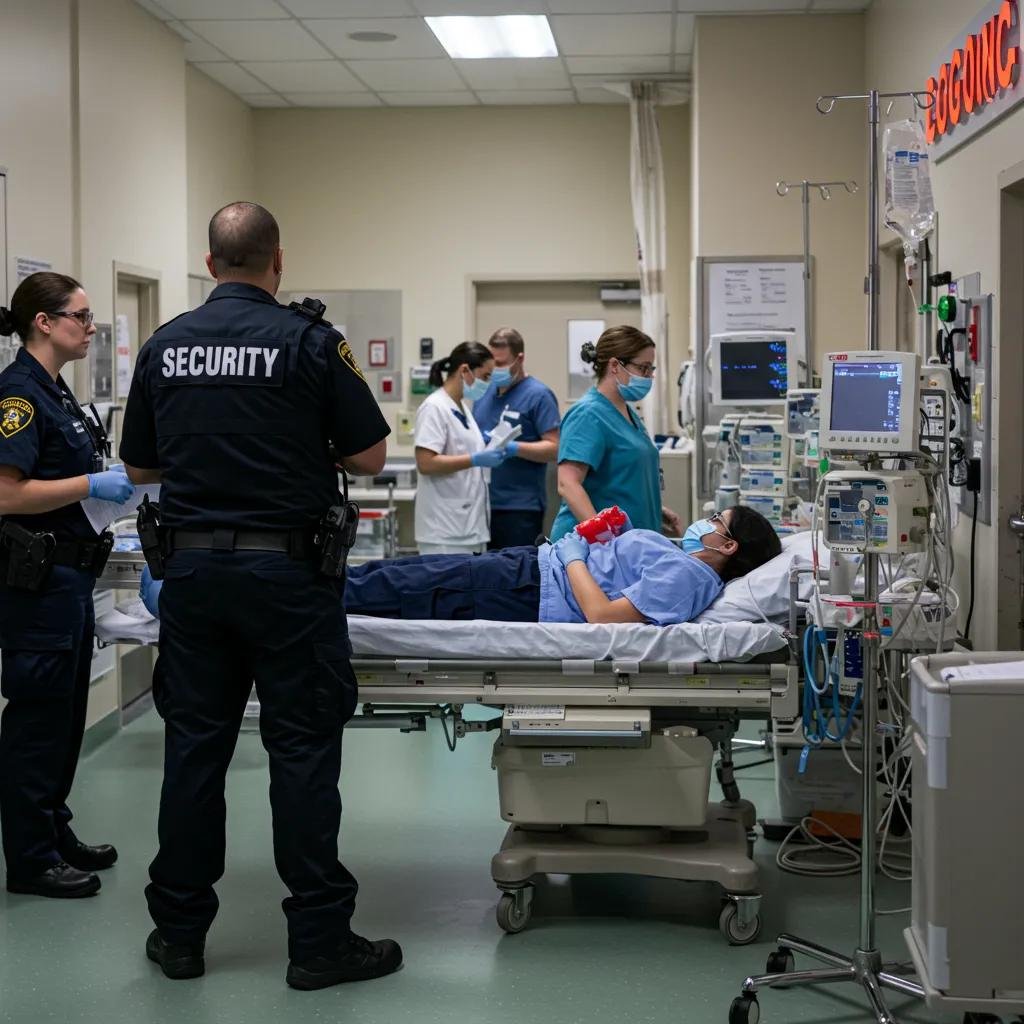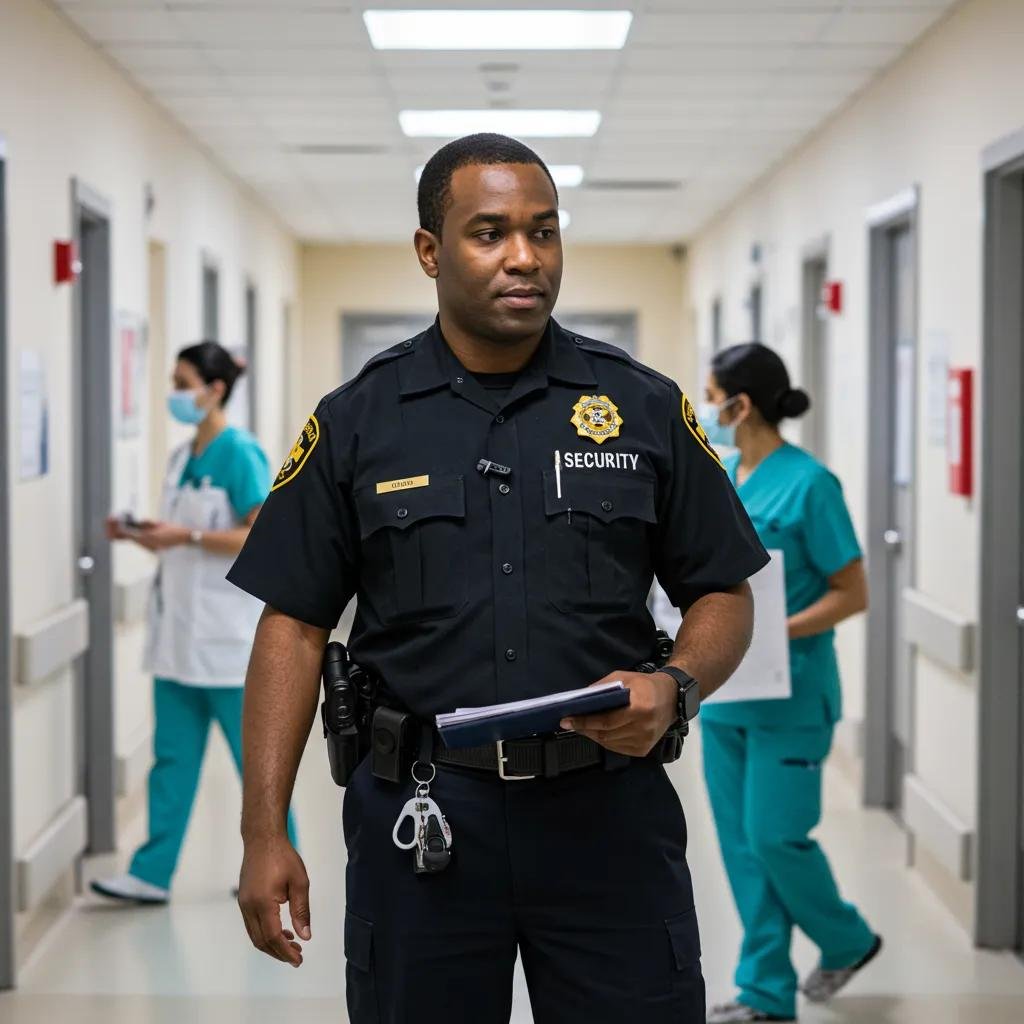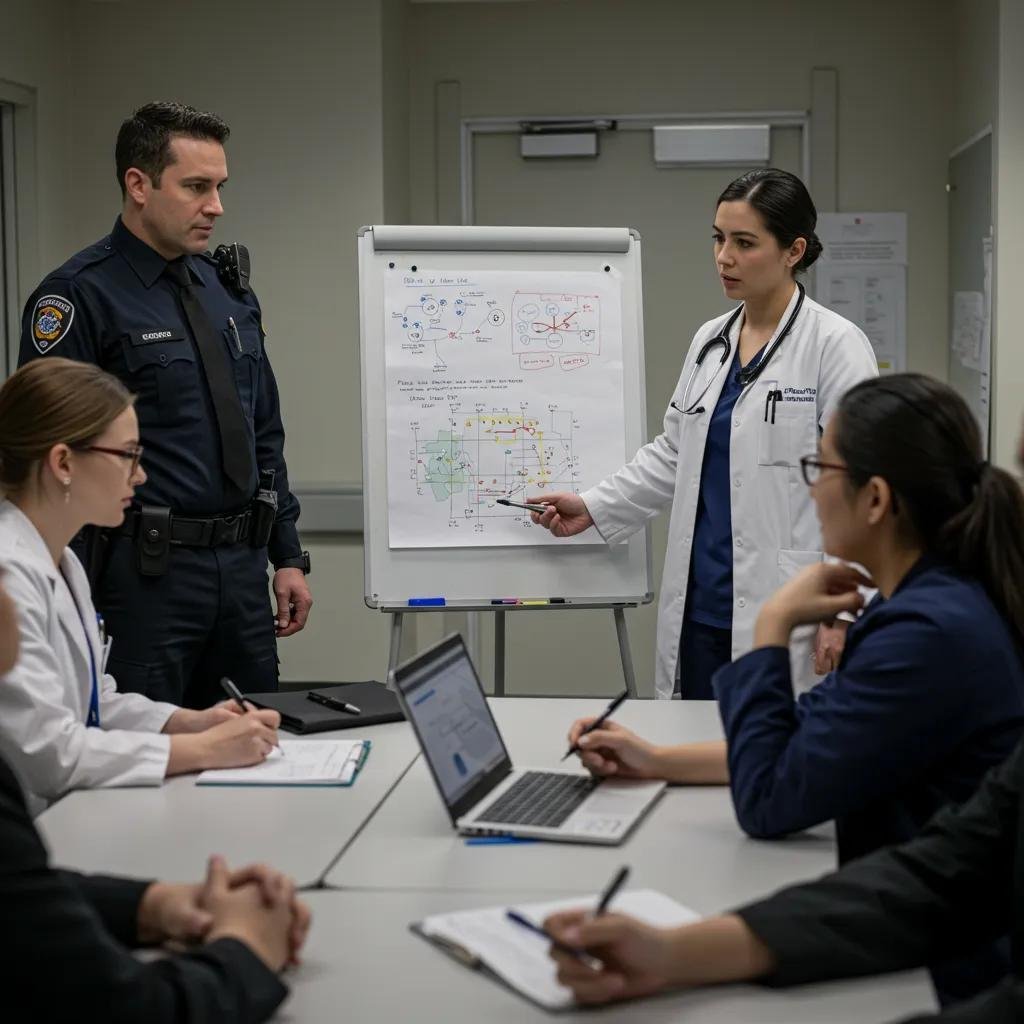
Specialized hospital security in Houston demands a combination of expert personnel, robust protocols, and industry-recognized standards. Mayer Security Services, as a proud IAHSS member and preferred vendor, delivers armed and unarmed healthcare security in Houston that protects patients, staff, and assets across hospitals, emergency rooms, and doctors’ offices. In this guide, we examine the key challenges faced by Greater Houston medical facilities, how Mayer Security Services tailors armed and unarmed solutions, specialized offerings for different facility types, strict IAHSS compliance, workplace violence prevention strategies, compelling reasons to choose Mayer, and how to request a tailored security assessment or quote. Each section builds on the core concept of comprehensive healthcare security solutions, offering actionable insights and clear benefits to Houston’s medical communities.
What Are the Key Healthcare Security Challenges in Houston Hospitals?
Healthcare security in Houston hospitals encompasses a range of threats, from aggressive incidents to unauthorized entry, that can compromise patient care and asset safety. Understanding these challenges defines the starting point for effective protection.
How Does Workplace Violence Impact Houston Healthcare Facilities?
Workplace violence in Houston medical centers arises from verbal threats, physical assaults, and emotional distress that endanger caregivers and patients. Violent incidents increase staff turnover, disrupt care workflows, and elevate liability risks. For example, emergency departments report higher rates of aggression due to heightened patient stress, underscoring the need for de-escalation protocols and trained security officers. Recognizing these impacts drives hospitals to adopt proactive prevention measures that reduce incidents and improve workplace morale.
What Are the Risks of Theft and Unauthorized Access in Medical Settings?
Theft of pharmaceuticals, medical devices, and personal belongings can occur when access control is inadequate in clinics and hospitals. Unauthorized entry into restricted areas jeopardizes patient records, expensive equipment, and research samples.
Study: Most healthcare data breaches caused by hacking
Research analyzing healthcare data breaches reported between 2010 and 2024 indicates a significant shift in the cyberthreat landscape. Initially, theft and unauthorized access were primary causes, but hacking and IT incidents have become the dominant factors, accounting for the majority of large healthcare data breaches and impacting a substantial number of patient records.
This study supports the article’s discussion on the risks of theft and unauthorized access in medical settings, contextualizing it within the broader trends of data breaches in healthcare.
In one instance, a loss of controlled substances due to a tailgating event highlighted the necessity of multi-factor entry systems and continuous perimeter monitoring. Addressing these risks through layered security controls protects assets and upholds regulatory compliance.
Why Is Patient and Staff Safety Critical in Hospital Security?
Patient and staff safety drives both quality of care and organizational reputation, making it a central pillar of hospital security in Houston. Safe environments foster healing, enhance patient satisfaction, and prevent costly incidents. When security teams swiftly intervene in disruptive situations, they preserve the therapeutic atmosphere essential to recovery. Prioritizing safety creates a virtuous cycle: confident staff deliver superior care, and patients benefit from uninterrupted treatment.
How Does Mayer Security Services Tailor Armed and Unarmed Security for Houston Healthcare?
Mayer Security Services customizes physical security by matching armed and unarmed guard deployments to the unique risk profiles of each healthcare facility. This mechanism ensures optimal protection while respecting clinical operations.
Before comparing roles, it’s essential to grasp that armed and unarmed services address different threat levels and facility needs. The following table summarizes the primary distinctions:
| Security Service Type | Typical Deployment Area | Key Advantage |
|---|---|---|
| Armed Security | Emergency rooms, high-risk wards | Immediate deterrence and lethal-force backup |
| Unarmed Security | Clinic reception, outpatient corridors | Patient-friendly presence and rapid incident reporting |
| Patrol & Surveillance | Parking garages, loading docks | Continuous monitoring and fast alarm response |
Each service complements the other, creating a cohesive security posture that adapts as threats evolve. Understanding these roles lays the foundation for deeper insights into armed and unarmed benefits.
What Are the Benefits of Armed Security Guards in Hospitals and Emergency Rooms?
Armed security guards deter active threats by their visible authority and rapid response capability. They manage critical incidents such as armed intrusions or violent outbreaks with precision and tactical training. In emergency rooms where tensions run high, armed officers provide an added layer of reassurance, helping de-escalate situations before medical staff intervene. Their presence also satisfies stringent regulatory standards and insurance requirements for high-risk healthcare areas.

How Do Unarmed Security Guards Support Medical Office and Clinic Safety?
Unarmed security guards excel at maintaining a welcoming yet secure environment in doctors’ offices and outpatient clinics. By conducting visitor screening, enforcing parking rules, and providing wayfinding assistance, they minimize the potential for unauthorized access and petty theft. Their de-escalation training enables them to resolve conflicts verbally, preserving patient dignity and comfort. These roles ensure that clinical operations proceed smoothly, with security support fully integrated into daily workflows.
How Are Patrol and Surveillance Integrated into Healthcare Security Solutions?
Patrol officers and surveillance teams form the eyes and ears of a comprehensive security system, linking on-site presence with advanced monitoring technology. Guards execute scheduled and random patrols, verifying perimeter integrity and responding to alarms. Meanwhile, centralized surveillance hubs track camera feeds, access logs, and sensor network alerts. This integrated approach leverages both human judgment and technological analysis to identify anomalous behavior, prevent unauthorized entry, and ensure rapid incident resolution.
What Specialized Security Solutions Does Mayer Provide for Different Healthcare Facilities?
Mayer Security Services designs facility-specific protocols by aligning service features to each medical environment’s operational dynamics. This customization maximizes protection while minimizing disruption.
How Is Hospital Security in Houston Customized for Patient and Staff Protection?
Hospital security protocols combine tailored guard deployments, secure access control, and visitor management systems that accommodate 24/7 operations. Guards receive unit-specific training—such as neonatal ward sensitivity or psychiatric unit de-escalation—ensuring patient safety without compromising care. Intra-facility communication channels link security officers with nursing stations and administration, creating a seamless incident response framework that protects both staff and patients at all times.
What Are the Unique Security Needs of Emergency Rooms in Houston?
Emergency rooms demand rapid threat assessment, crowd control, and crisis de-escalation capabilities to manage emotionally charged individuals. Mayer’s ER security officers undergo specialized training in aggressive patient behavior management and medical triage procedures. They implement fast-response alarm protocols and maintain secure zones for critical care, ensuring that high-stress environments remain both safe and operationally efficient under peak demand conditions.
How Does Mayer Secure Doctors Offices and Medical Clinics in Houston?
Clinic security focuses on controlled access, asset protection, and visitor facilitation to support outpatient workflows. Mayer installs electronic check-in kiosks monitored by unarmed guards, enforces medication storage protocols, and conducts vendor screening. By customizing foot-traffic patterns and installing lockout procedures for after-hours care, security teams shield sensitive patient data and pharmaceuticals while preserving the open, welcoming atmosphere intrinsic to clinic operations.
How Does Mayer Security Services Implement IAHSS Guidelines in Houston Healthcare Security?
Adherence to IAHSS standards ensures that Mayer Security Services aligns operational practices with industry best practices for healthcare safety and security.
What Are the Core IAHSS Standards for Healthcare Security?
IAHSS guidelines define comprehensive security benchmarks, including risk assessment frameworks, officer training competencies, incident classification protocols, and performance measurement metrics. These standards mandate ongoing professional education, use-of-force policies, and emergency preparedness drills tailored to healthcare settings. By embedding these benchmarks into every program, Mayer Security Services fosters continuous improvement and aligns with internationally recognized practices.
Healthcare Security Industry Guidelines, 13th Edition
The International Association for Healthcare Security and Safety (IAHSS) publishes comprehensive industry guidelines that establish benchmarks for effective healthcare security programs. These guidelines cover critical areas such as risk assessment frameworks, officer training competencies, incident classification protocols, and performance measurement metrics, aiming to ensure a safe and secure environment in healthcare facilities.
This citation verifies the existence and purpose of the IAHSS guidelines, which the article states Mayer Security Services adheres to for industry best practices.
How Does Mayer Ensure Compliance with IAHSS and Texas Healthcare Regulations?
Mayer Security Services conducts regular audits, policy reviews, and training refreshers to maintain compliance with IAHSS and Texas state mandates—such as workplace violence prevention plans required by 2023 legislation. Security officers complete documented drills on HIPAA-related confidentiality, JCAHO-aligned incident reporting, and OSHA-mandated safety protocols. Periodic third-party assessments validate adherence, reinforcing a culture of accountability and regulatory excellence.
Why Is IAHSS Membership Important for Healthcare Security Providers?
IAHSS membership signifies a commitment to specialized professional development, networking, and continuous alignment with healthcare security innovations. Members gain access to research resources, industry conferences, and certification programs that drive operational excellence. For clients, selecting an IAHSS-affiliated provider like Mayer Security Services conveys trust in a partner who meets the highest standards of healthcare security and safety.
How Does Mayer Security Services Address Workplace Violence Prevention in Houston Healthcare?
Preventing workplace violence involves data-driven strategies, specialized training, and collaborative planning with healthcare stakeholders.

What Are the Latest Workplace Violence Statistics in Texas Healthcare?
Recent data shows that over 98 percent of Texas hospitals report stable or increased violence since the pandemic, with 61 percent indicating greater incident severity. Healthcare settings account for 73 percent of all nonfatal workplace-violence injuries nationwide, and nearly one in five nurses have left positions due to safety concerns. These figures highlight an urgent need for structured prevention plans and dedicated security resources within Houston facilities.
Workplace Violence – Texas Hospital Association
A survey conducted by the Texas Hospital Association in late 2022 revealed that 98% of Texas hospitals reported workplace violence had either increased or remained stable since the start of the pandemic. Additionally, 61% of these hospitals indicated an increase in the severity of violent incidents, highlighting a persistent challenge within healthcare settings.
This research directly supports the article’s claims regarding the prevalence and increasing severity of workplace violence in Texas hospitals.
How Does Mayer Train Security Staff and Healthcare Workers for Violence Prevention?
Mayer Security Services delivers joint workshops that combine security officer tactical training with healthcare worker de-escalation techniques. Programs cover conflict resolution, communication skills, situational awareness, and use-of-force decision-making. By running live-scenario drills in hospital corridors and clinic reception areas, participants build confidence and competence in preventing or defusing violent events before escalation.
What Steps Are Involved in Developing a Healthcare Workplace Violence Prevention Plan?
A robust prevention plan begins with a facility-wide risk assessment to identify hotspots and vulnerable populations. Next, cross-functional teams draft policies on reporting, response protocols, and accountability metrics. Implementation involves officer and staff training, installation of alarm systems, and regular drills. Finally, ongoing evaluation through incident tracking and feedback loops ensures continuous refinement and alignment with evolving threats.
Why Choose Mayer Security Services as Your Preferred Healthcare Security Company in Houston?
Choosing Mayer Security Services means partnering with a locally focused, industry-authorized team that delivers measurable security outcomes and peace of mind.
How Does Local Houston Expertise Enhance Mayer’s Security Services?
Deep familiarity with Greater Houston’s healthcare landscape enables Mayer to anticipate and mitigate region-specific risks—such as high-traffic ER surges and suburban clinic vulnerabilities. Local teams maintain rapid dispatch capabilities, strong relationships with law enforcement, and cultural understanding that fosters seamless collaboration with facility staff. This regional specialization ensures timely, nuanced security solutions unmatched by generalist providers.
What Do Healthcare Clients Say About Mayer’s Security Solutions?
Healthcare administrators praise Mayer Security Services for its professionalism, responsiveness, and operational integrity. In one case study, a major Houston hospital reported a 45 percent reduction in workplace violence incidents after deploying Mayer’s combined patrol and training program. Testimonials emphasize the company’s reliability, clear communication, and ability to adapt solutions around dynamic clinical demands.
How Does Mayer’s Preferred Vendor Status Benefit Houston Healthcare Facilities?
As a preferred vendor, Mayer Security Services guarantees streamlined procurement, predictable pricing, and ongoing priority support. Facilities gain expedited onboarding, customized service-level agreements, and direct access to senior security consultants. This status reflects consistent performance, high client satisfaction, and a proven track record delivering healthcare security excellence across the region.
How Can Houston Healthcare Facilities Request a Security Assessment or Quote from Mayer Security Services?
Engaging Mayer Security Services begins with a detailed security assessment that lays the groundwork for a tailored protection plan.
What Is Included in a Comprehensive Healthcare Security Assessment?
A full assessment evaluates perimeter integrity, access control systems, camera coverage, patrol routes, and incident-response protocols. Security consultants interview clinical leaders, review incident histories, and perform vulnerability scans of physical and procedural elements. The deliverable is a gap analysis report with prioritized recommendations and cost estimates, providing a clear roadmap for enhancing safety and compliance.
How to Contact Mayer Security Services for Customized Healthcare Security Solutions?
To request an assessment or personalized quote, healthcare administrators can call the dedicated Houston security hotline or complete the secure online inquiry form. A senior consultant will schedule an on-site consultation within 48 hours, gather facility details, and outline next steps. This streamlined process ensures that hospitals, clinics, and emergency rooms receive expert guidance without delay.
Mayer Security Services combines IAHSS-aligned standards, local insight, and tailored armed and unarmed guard deployments to deliver industry-leading hospital security in Houston. By addressing workplace violence, theft prevention, and regulatory compliance, their solutions enhance patient and staff safety across diverse healthcare settings. Clients benefit from measurable incident reductions, positive testimonials, and preferred vendor advantages that streamline procurement and service delivery. Partnering with Mayer ensures that Greater Houston’s medical facilities maintain the highest level of protection and operational continuity.


